Keyword research is an integral part of Search Engine Optimisation (SEO). Without it, the content you create won’t be found on the Search Engine Result Pages (SERPs), because you won’t be targeting the phrases your customers are searching for.
The good news is that it’s easy to conduct effective SEO keyword research, and you can make a good start by using a number of free keyword research tools.
In this guide, we’ll cover:
- What SEO keyword research is and why it’s important
- Identifying potential keywords
- Understanding organic search intent
- Researching related keywords
- Choosing target keywords
A lot of content within the SEO industry can make the process of optimising content appear overly confusing.
While Google’s algorithm has come a long way and takes into account a multitude of different factors, there’s still a significant amount of importance placed on simply ensuring that your content aligns with keyword terms that your target audience are using.
What is keyword research and why is it important?
Keyword research for SEO is the process of finding the terms and keywords that people actually use to find your website’s products and services.
It’s an essential part of SEO – we need to understand how people search for what your business offers. Just because your business has named your products or services in a certain way, it doesn’t mean that this is how your audience is actually searching for them.
Keyword research should also take into account average monthly search volumes, which is how many times a particular query is searched in a month. The higher the search volume, the more times that keyword is searched every month.
You also need to take into consideration keyword difficulty: this is the level of competition that a keyword has in SERPs. Essentially, it’s an estimate of how difficult it will be to rank for a particular keyword.
The keyword difficulty score is calculated based on various factors such as the number of websites that are ranking for the same keyword, their authority and backlink profiles, and the quality and relevance of their content. The higher the keyword difficulty score, the more difficult it is to rank for that keyword.
If you’re just starting out in SEO, keyword difficulty scores can be a useful indicator. But over time you’ll naturally start to understand which keywords are going to be difficult to rank, based on the industry they’re in and their search volumes.
It’s important to find a balance between keyword search volume and difficulty and both of these metrics are important in helping to define an SEO strategy and ensuring that decisions are led by data.
For example, there could be pressure within a business to rank well for a certain term. Carrying out keyword research and looking at the data could illustrate that this isn’t the best course of action.
That particular term might be way too competitive, with a huge monthly search volume and no chance of ranking well against the competition. Or, it might not be searched for at all, with much better alternatives out there.
Keyword research helps us find the sweet spot between the two and ensures that decisions affecting keyword strategy are grounded in data.
Keyword research is generally one of the first steps in an SEO strategy, whether that’s auditing an existing site, working on keyword targeting for a brand new website, developing a content strategy, or creating a content brief for a new blog or landing page. It underpins the whole lot.
Identifying potential keywords
1. Brainstorm keyword ideas
The first step in the SEO keyword research process is simply understanding the terms you might like to rank for. Before you choose the term you want a page to target, you need to research which potential keywords are available.
Start by making a list of all the main terms you’d like to rank for and start thinking of topical themes relating to these. For example, terms related to SEO as a broad term might include more niche things like ‘javascript seo’, ‘technical seo’ and ‘ecommerce seo’.
2. Ask your customers and colleagues
If you have the option to, it can be invaluable to ask your customers what terms they used to reach your website or refer to your products.
Alternatively, asking customer-facing internal teams such as salespeople and support staff what sort of questions they’re being asked and what terminology customers are using can be a great way to uncover some valuable search queries and informational content ideas.
Understanding keyword intent
Before going any further, understanding the search intent (underlying purpose or motivation) behind certain keywords is an essential step in ensuring that your pages match what the user is looking for.
There’s four core types of search intent, which are all found at different stages of the funnel.
Starting at the top of the funnel, we have the awareness stage, where keywords have an informational or navigational search intent:
- Informational – this is when a user is at the start of their buying journey and using informational or long-tail keywords to gather information and inspiration on a topic. For example, ‘bedroom decoration ideas’. They don’t currently know what they want and are after an answer or some ideas. Usually, it’ll be blog articles or other informational content types ranking for these sorts of queries.
- Navigational – this is when a user is trying to find a specific website or page, such as ‘semrush login’.
Next, we have the mid-funnel consideration stage where you can find commercial keywords:
- Commercial – at this stage, users have found what they’re after and are doing a bit more research and comparing different sites. For example, ‘what is the comfiest fluffy blanket’. URLs ranking for these sorts of terms are often major publications, authoritative review, comparison sites, or affiliate sites, so you may be fighting a losing battle if you’re attempting to rank for these sorts of queries.
Finally, there’s the bottom of the funnel decision stage where there are specific conversion-focused keywords:
- Transactional – terms used when a user has made a decision and is ready to convert. For example, ‘buy fluffy blankets’.
Ensure the pages you’re creating and the keywords you want to target match the user’s intent. You wouldn’t expect a product page to rank for ‘bedroom decoration ideas’, whereas you’d expect a category or product page to rank for ‘buy fluffy blankets’.
Researching related keywords
1. Use Google’s features on the SERPs
Google’s related search and ‘People also ask’ box are useful for finding related terms and content ideas:
With search intent in mind, content targeting for each of these queries will differ:
- ‘Do you wash fluffy blankets’ would be best as some informational and supporting content on a product or category page.
- ‘Luxury fluffy blankets’, ‘extra large fluffy blankets’ and ‘light fluffy blankets’ could potentially form new category pages.
- ‘What is the world’s most comfortable blanket’ could be a nice piece of informational content, such as a blog post.

 You can repeat this process by clicking on the options Google suggests until you’ve got a sizable list of new potential keywords to target.
You can repeat this process by clicking on the options Google suggests until you’ve got a sizable list of new potential keywords to target.
The beauty about this method is that it’s 100% accurate and real-time data – you were just searching something so you can rest assured that these ideas are keywords that people are actually using.
The Glimpse plugin on Google Trends also collates a lot of this information for you within the Google Trends dashboard: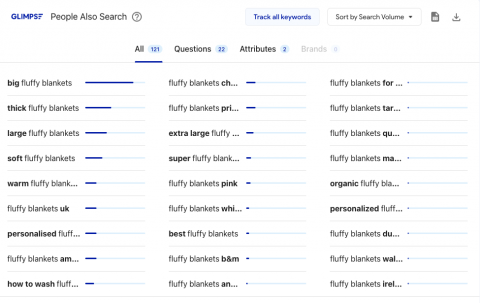
2. Using Google Search Console to uncover keyword opportunities
An invaluable resource, Google Search Console uses data that people actually have used to access your site or which made your site appear in the search results (gain impressions).
There’s likely to be a good amount of terms you might not have considered here, including lengthy informational terms.
You can use Search Console to understand what keywords URLs are currently ranking for, including on pages where no one’s going to see or click on these. However, the usefulness here is that it can highlight some ideas you might not have thought of.
Filter by an individual URL and look at queries that have a high number of impressions but very low or no clicks – this can highlight new opportunities for either widening the net of target keywords on an existing URL, or creating a new bit of content.
High impressions suggest that Google wants to rank our site, so with a bit of refinement we should be able to start gaining clicks too by targeting keywords with the right search intent and conducting some on-page SEO optimisation.
As an example, this blog on Google Analytics event tracking has a high number of impressions but zero clicks for the query ‘google analytics tracking code generator’. 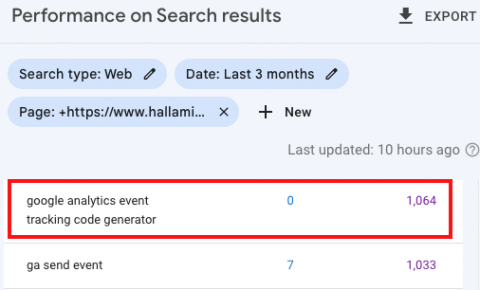 Thinking back to the earlier stages of looking at the SERPs and assessing search intent, we can see here that all the URLs ranking are single page tools that help users create the right tracking code:
Thinking back to the earlier stages of looking at the SERPs and assessing search intent, we can see here that all the URLs ranking are single page tools that help users create the right tracking code: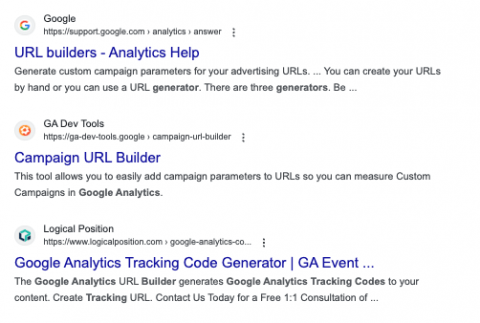 So, if we wanted to rank for this term we’d most likely need to create a version of the tool and host that on a new URL, linked to from the Google Analytics event tracking blog.
So, if we wanted to rank for this term we’d most likely need to create a version of the tool and host that on a new URL, linked to from the Google Analytics event tracking blog.
On this new page, we could also answer these questions as these are ones that people are asking when searching using that target keyword: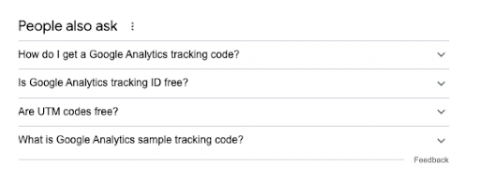
How to know what keyword to target
1. Assess the competition
Firstly, take the terms you think you should be ranking for and look at your competition on Google. What kind of domains are ranking?
If they’re highly authoritative household names you’re up against, accept that you’re not going to rank for that term and think about other ways you could gain traffic, whether that’s using a more niche variation of that term, or informational content at the top end of the funnel.
It may be useful to strike off any keywords that you simply will not have a chance at ranking well for.
2. Use paid tools to gain more data
Paid tools, such as Semrush, are a great keyword research resource when it comes to getting more information on a set of keywords, such as search volumes and keyword difficulty.
They allow you to gain deeper insight into how competitive a term will be and identify further opportunities.
You can type in a particular keyword you’d like to find out more about. I’ve used ‘digital marketing agency’ as an example. Scroll down, and you’ll see a list of ‘phrase match’ keywords and ‘related’ keywords (provided there are any).
Click through, and you’ll have a full list of keywords, including their search volume, trends and keyword difficulty. 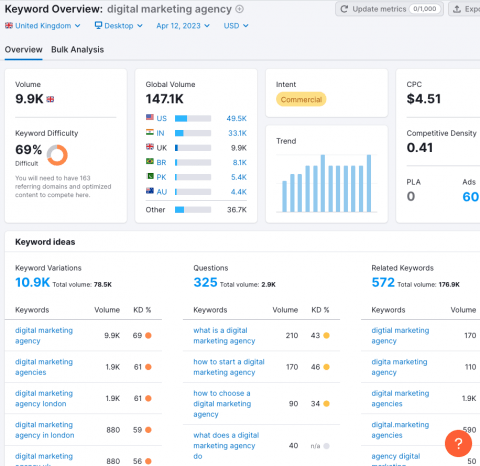 This can be a great source of inspiration for either creating new optimised landing pages or blog articles, or identifying new keywords for your current pages to rank for.
This can be a great source of inspiration for either creating new optimised landing pages or blog articles, or identifying new keywords for your current pages to rank for.
If you head back to the main results page, you can also see the list of organic results based on the keyword you typed in. Interestingly, I’ve found that it doesn’t always bring back who you think your competitors are – so it means you can do some more digging into keywords that your online competitors are ranking for.
When it comes to pricing, whilst Semrush does have a free version, it’s very limited in terms of the information it provides. To really make the most of this online keyword tool, you’re better off opting for the paid version.
Note that the Glimpse plugin will also allow you to see estimated search volume within the Google Trends chart, and how that has changed over time. Although, do note you only get a certain number of searches with volume data per month for free: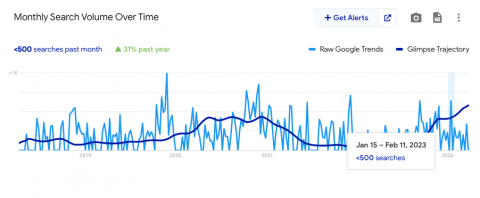
What do you do with completed keyword research?
With your list of target keywords in shape, the next step is applying optimisation targeting these terms to URLs on your site.
Keyword research isn’t something that is just done once and left, either. You should be regularly researching new target keywords and identifying new opportunities, so that you can continue to grow your organic presence.







